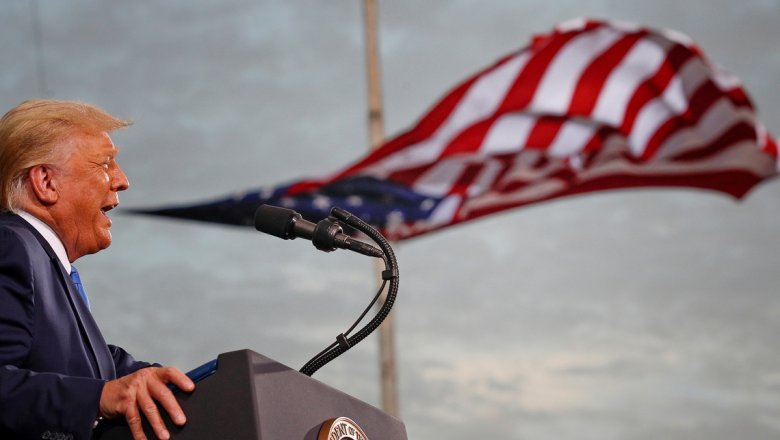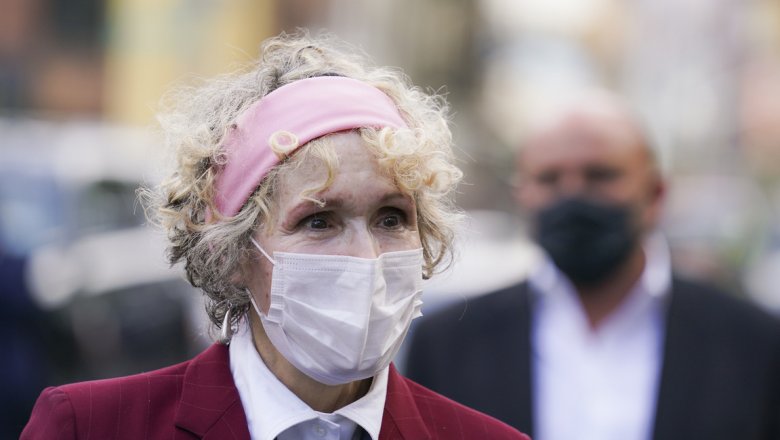Exactly at noon on January 20, 2021, Donald Trump will leave the presidency and become a private person. At the same time, he will lose one of the main advantages that the head of state in the United States has - full immunity from prosecution.
Last week, hours after the pardon was announced for his former national security adviser Michael
Flynn, President Trump made it clear that he himself deserves a full pardon.
The head of the White House tweeted a post previously posted by
Gaetz, in which the legislator said that the president should pardon everyone, starting with himself
and including employees of his administration.
According to the US Constitution, the President has the right to declare a pardon for any citizen
of the country, regardless of the severity of the crimes committed. In the past four years, Trump
has taken this opportunity extensively.
The long list of those exempted from criminal liability includes a close friend and adviser to the
presidential campaign headquarters Roger Stone, convicted of perjury and attempts to intimidate
witnesses,
Governor Rod Blagojevich, caught on extortion, and convicted of fraud media mogul Konrad Black.
According to a long-standing tradition, the outgoing president announces the loudest pardons
before leaving the White House forever.
According to the New York Times, in the past four years, Trump has been involved in exactly 30
civil and criminal cases related to his election campaign, taxes and companies belonging to him.
Until now, the president's lawyers have managed to insist on the postponement of the court
hearings, citing the immunity of the head of state. According to the lawyers of the US
Department of Justice, who represented the interests of the head of the White House in the courts,
the content of any documents related to Trump also cannot be disclosed in a public hearing.
All of these arguments will expire at noon on January 20, 2021. In addition, the
be able to count on the help of representatives of the Ministry of Justice.
Experts admit that on some of the charges, Trump could face a real prison sentence. Most,
however, agree that most likely the court hearings will end with the payment of substantial fines
and compensation to the victims.
Another problem for Trump may be the public disclosure of the details of his
bank loans. Over the past four years, the President of the United States has consistently refused
to disclose the details of his tax returns , citing the fact that they have been audited all this time.
According to Forbes magazine , the debts of companies owned by Trump are more than $ 1 billion,
and in the next two years the former businessman will have to pay creditors in excess of
$ 450 million.
Most of the lawsuits Trump should worry about will come from his hometown,
In 2018, the President's former personal lawyer, Michael Cohen, pleaded guilty to violating the
rules for the use of funds received on the campaign accounts.
According to the indictment, before the 2016 elections, he paid porn star Stormy Daniels
$ 130,000 for nondisclosure of information about her sexual relationship with Trump.
The name of the payer was not mentioned in the documents of the case. He was featured as
"Individual-1", but prosecutors were quick to clarify that he was also a successful US presidential
candidate.
The Federal Attorney's Office for the Southern District of
indictment against Michael Cohen, then decided not to bring any charges against the incumbent
president, citing the immunity of the head of state. Nevertheless, the prepared materials on the
case became a pretext for initiating criminal cases against Trump.

Manhattan District Attorney Cyrus Vance has launched an investigation into "possible large-scale
and long-running criminal offenses " owned by the president of the Trump Organization. Potential
charges include tax return and insurance fraud, and willful asset manipulation.
As part of his deal with the investigation, the president's former personal lawyer, Michael Cohen,
said that Trump used double-entry bookkeeping in his business: one in which assets were
overvalued to obtain loans and credits, and the other, which indicated an undervalued value, to
minimize taxes.
As the New Nork Times found out , the use of this scheme allowed Trump to not pay income taxes
at all for 10 years.
The district attorney's office has already formally demanded that law firm Mazars USA LLC provide
Trump's tax filings for the past eight years.
In October 2019, the US Supreme Court ruled that the president's immunity does not apply to a
decision to transfer these documents to the Manhattan prosecutor's office.
Trump's lawyers tried to appeal against the Supreme Court verdict, but lost all appeals in the lower
courts. At the last moment, the president's legal team again appealed to the Supreme Court,
demanding to ban the transfer of documents "due to the extraordinary circumstances associated
with the situation of the defendant."
A final decision on the case has not yet been made, but lawyers believe that Trump is unlikely to
face criminal charges.
Another investigation into the outgoing US president is being led by
General Laetitia James. Court documents mention four Trump Organization development
projects in
businessman to buy the Buffalo Bills American football team.
In March 2019, the state attorney general's office sent formal requests for submission of relevant
documents to Deutsche Bank and Investors Bank. So far, we are talking about charges in the
framework of civil proceedings, but Attorney General James has already announced that she is
ready to transfer the case files to the district attorneys' offices if she manages to detect signs of
criminal offenses.
In recent years, several women have accused Trump of sexual harassment and violence.
In her book, published in 2019, journalist Jean Carroll stated that Trump raped her 20 years ago in
a fitting room of a clothing store. The US President denied these accusations, saying that they were
made only to increase sales of the book, and Carroll herself is generally "not his type."

US Department of Justice lawyers, representing the president's interests, secured the transfer of
the case from the
be a reason for legal proceedings, since they were protected by the immunity of the head of state.
At the end of October this year, the judge rejected the petition of the lawyers of the head of state.
A similar lawsuit against the president in early 2017 was filed by the former participant of the
television show "The Apprentice" Summer Zervos. She stated that during filming, Trump kissed
her forcibly and grabbed her by the chest.
The president has agreed to testify in court, but, at the insistence of his lawyers, hearings on the
case can only begin after the decision of the
of next year.
According to the American media, citing its own sources in the administration, since 2017, Trump
has repeatedly asked his advisers to ask whether he can officially sign an order to pardon himself
and his family members.
“When he found out that he had such a right, it became his obsession,” said a former senior CNN
administration official.
The second paragraph of the second article of the US Constitution does indeed read: "The
President should ... have the power to grant deferrals and pardon for crimes against the United
States."
Following the voluntary resignation of President Richard Nixon in 1974, the Justice Department
issued a special clarification, stating that such a pardon was not possible "under the fundamental
rule that no one can act as a judge in their own case."
President Nixon, however, did not need this clarification: shortly after his resignation, he was fully
pardoned by his successor as President of the United States, Gerald Ford.
According to lawyers in Washington, Donald Trump can take advantage of this very precedent,
voluntarily resigning from his presidency on the eve of his inauguration on January 20, and thus
giving
True, according to US law, a presidential pardon applies only to federal crimes and does not apply
to criminal and civil cases that are tried by district and district courts.
Despite the doubts of experts, Trump himself seems to be confident that he has every right to take
such a step.
“As it has already been stated by numerous experts in the jurisprudence, I have the absolute right
to Pardon myself, but why should I do this if I haven’t done anything illegal?” The president wrote
on Twitter in 2018.
source: BBC News Russian Service








No comments:
Post a Comment